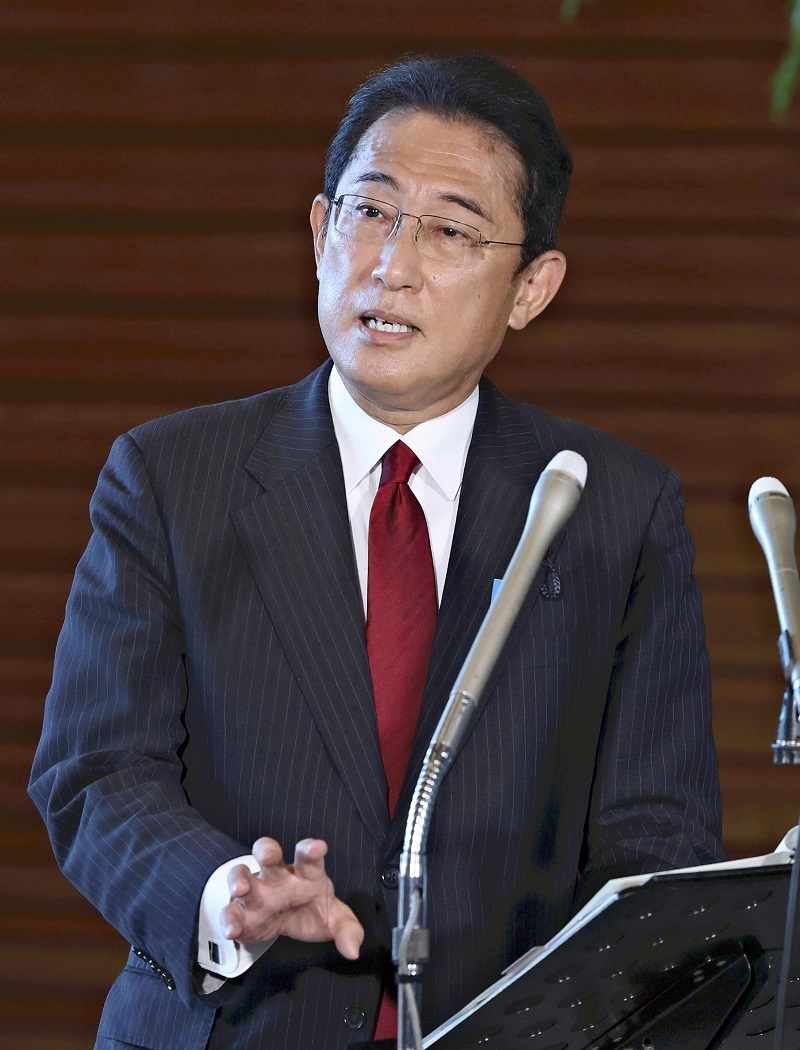
Prime Minister Fumio Kishida speaks during a press conference in Tokyo on Tuesday.
17:25 JST, September 7, 2022
The government’s decision to shorten the self-isolation period for people infected with coronavirus marks another step forward in its pandemic strategy of coping with the virus as the seventh wave of infections subsides.
The change to a shorter self-isolation period is aimed at enabling people who catch the virus to return more quickly to work and is among the measures the government plans to take as greater emphasis is placed on restoring economic and social activities to normal levels.
In preparation for any future surge in infection numbers, the government intends to revise relevant laws and take other measures to strengthen the medical care system.
Prime Minister Fumio Kishida announced Tuesday that, after a final decision on the matter later this week, the self-isolation period for symptomatic patients will be cut to seven days from the current 10. The period for asymptomatic infection cases will be cut from seven to five days provided the infected individual tests negative for the virus.
Speaking to reporters at the Prime Minister’s Office, Kishida declared the isolation period would be cut because a downward trend in infection cases “had been confirmed” across Japan.
According to Health, Labor and Welfare Ministry figures, the number of new infections in Japan during the week through Monday was down 31% from the previous week, continuing a recent downward trend.
During the self-isolation period, patients must refrain from venturing outside. Shortening this period would enable people with mild or no symptoms to return to work more quickly, and could minimize disruption to business activity and the provision of public services.
The current requirement to report all COVID-19 cases is also set to change to a new framework under which only cases where the patient has a high risk of becoming severely ill must be reported. Through the change, the government aims to ease the burden on public health centers and medical institutions, and also concentrate resources more on providing treatment to seriously ill patients.
However, once the rules are revised it could become a challenge to monitor the health of young people and others whose cases will no longer be reported. Kishida said the prefectural governments’ health follow-up centers would continue to help deliver food and arrange accommodations where patients can recover.
The government will also consider implementing a trial under which only medical institutions designated by a local authority would report information about infection cases.
During the extraordinary Diet session scheduled to start this autumn and next year’s ordinary Diet session, the government plans to bolster preparations for future pandemics by revising the Infectious Diseases Law.
The government wants to make it mandatory for certain kinds of hospitals to secure beds for patients, and will also seek to enhance treatment for infectious diseases by submitting relevant bills to strengthen the government’s ability to coordinate a response.
The government’s decision on the length of the period patients should recuperate at home or elsewhere was based on findings from research that examined how long it was possible to detect in an infected individual virus levels capable of causing infection.
Based on previous research, symptomatic patients were thought to be infectious for about 10 days after they developed symptoms. Consequently, the self-isolation period was set at 10 days.
In late January, the government decided to reduce the quarantine period for asymptomatic patients to seven days because of scientific evidence confirming that there was a “low” probability such individuals might infect others.
Ahead of the latest decision, the health ministry enlisted the assistance of experts to examine how long the virus could be detected in patients who had caught COVID-19’s omicron variant.
The results reportedly differed little from earlier research. However, the proportion of patients in whom the virus could be detected on or later than the eighth day dropped to a certain extent. Consequently, the government compiled a plan to cut the quarantine period, which a health ministry official said was “necessary for society to continue to function.”
Toho University Prof. Kazuhiro Tateda, an expert on infectious diseases, said: “Shortening the quarantine period leaves the risk that a patient might infect others during the first few days after this period has elapsed. These people must continue taking precautions such as wearing a mask and staying away from elderly people and others at high risk of becoming severely ill.”
Top Articles in Society
-

Man Infected with Measles Reportedly Dined at Restaurant in Tokyo Station
-

Man Infected with Measles May Have Come in Contact with Many People in Tokyo, Went to Store, Restaurant Around When Symptoms Emerged
-

Woman with Measles Visited Hospital in Tokyo Multiple Times Before Being Diagnosed with Disease
-

Australian Woman Dies After Mishap on Ski Lift in Nagano Prefecture
-

Foreign Snowboarder in Serious Condition After Hanging in Midair from Chairlift in Nagano Prefecture
JN ACCESS RANKING
-

Japan PM Takaichi’s Cabinet Resigns en Masse
-

Japan Institute to Use Domestic Commercial Optical Lattice Clock to Set Japan Standard Time
-

Israeli Ambassador to Japan Speaks about Japan’s Role in the Reconstruction of Gaza
-

Man Infected with Measles Reportedly Dined at Restaurant in Tokyo Station
-

Videos Plagiarized, Reposted with False Subtitles Claiming ‘Ryukyu Belongs to China’; Anti-China False Information Also Posted in Japan
























